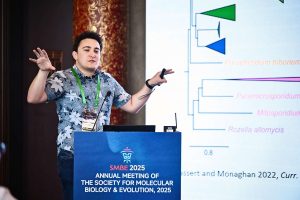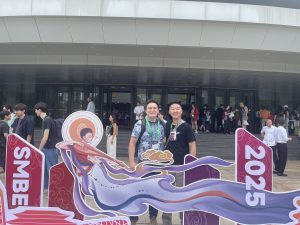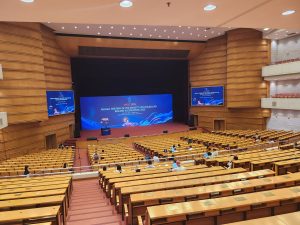My name is Padraic Heneghan, and I am a Postdoctoral Research Fellow with the Wolfe Lab at University College Dublin. The Irish Fungal Society (IFS) has been a constant source of support and encouragement throughout my early career, including my PhD. I was absolutely honoured to receive the Ken Haynes Travel Award from IFS, which allowed me to attend the Society for Molecular Biology and Evolution (SMBE) Annual Meeting 2025 in Beijing, China.
SMBE’s Annual Meeting has had a very big impact on my research journey. During the third year of my PhD, SMBE 2023 was the first conference I attended without members of my lab present, and I was understandably exceptionally nervous! However, I found the same energy, passion for research, and exceptional research quality as I have experienced with IFS, making many connections with which I keep in contact.
SMBE 2023 was the first conference I attended without members of my lab present, and I was understandably exceptionally nervous! However, I found the same energy, passion for research, and exceptional research quality as I have experienced with IFS, making many connections with which I keep in contact.
The conference covers extremely diverse topics from ancient DNA analysis to new fungal model organisms to population genomics. Because of the diversity of these research interests, the conference’s format encourages thorough communication on the background of a research topic, but all grounded in our shared foundational understanding of genetics and evolution. As a result, this format allows researchers from a wide range of backgrounds to contribute to each other’s research.
The conference boasts some of the most insightful and enlightening keynote speakers of any meeting. At SMBE 2025, Professor Peter Holland presented one of the most uplifting presentations I have ever seen, describing his and his network’s research on the Darwin Tree of Life Project. The Darwin Tree of Life Project is dedicated to th
e ambitious mission of sequencing the genomes and transcriptomes of every eukaryote in Britain and Ireland. Using this information, we can understand rapid evolution between close sister species, and from an even broader perspective, understand the wide evolutionary diversity within eukaryotes. Most importantly, there are so many labs who cannot afford and do not have the resources to sequence their organism of interest, but a project like this can assist these labs immensely, providing them incredible insights and data.
I had the opportunity to present my work on the evolution of zymocin-like toxins in fungi. Professor Ken Wolfe, Dr. Letal Salzberg, and I have shed light on these elusive and rather neglected toxins. Though originally found in only four yeast species, our research has uncovered over 100 zymocin-like toxins across budding yeasts and filamentous ascomycetes from sequencing data. The session of my presentation was also the first session I had ever chaired, and it was full of the wide breadth of talks that underscored the goals of the SMBE meeting. I listened to incredible talks on the evolution and conservation of protein-RNA interactions in microRNA processing across eukaryotes from Dr. Yeonwoo Park and the diversity of endogenous retroviruses in frogs from Prof. Ravinder Kanda, to name a few. All the talks were wonderfully presented and of the highest standards.
I would sincerely like to thank the IFS for supporting my trip to the conference and for supporting me for so many years. The ability to speak with and engage with the research community worldwide is of the utmost importance, and the connections and knowledge I have gained from this conference will have a
like to thank the IFS for supporting my trip to the conference and for supporting me for so many years. The ability to speak with and engage with the research community worldwide is of the utmost importance, and the connections and knowledge I have gained from this conference will have a  great impact on my future research endeavours.
great impact on my future research endeavours.
